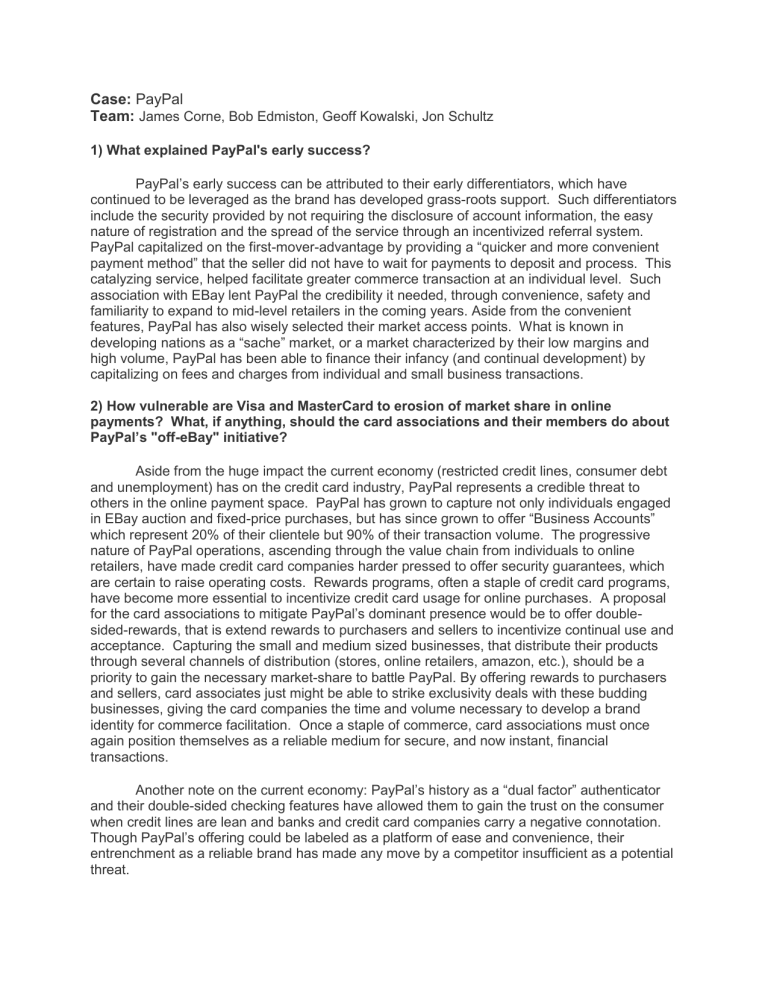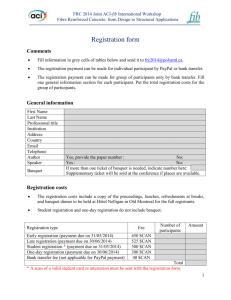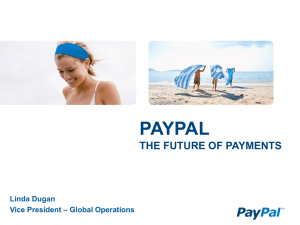Case: PayPal Team: James Corne, Bob Edmiston, Geoff Kowalski

Case: PayPal
Team:
James Corne, Bob Edmiston, Geoff Kowalski, Jon Schultz
1) What explained PayPal's early success?
PayPal’s early success can be attributed to their early differentiators, which have continued to be leveraged as the brand has developed grass-roots support. Such differentiators include the security provided by not requiring the disclosure of account information, the easy nature of registration and the spread of the service through an incentivized referral system.
PayPal capitalized on the first-moveradvantage by providing a “quicker and more convenient payment method” that the seller did not have to wait for payments to deposit and process. This catalyzing service, helped facilitate greater commerce transaction at an individual level. Such association with EBay lent PayPal the credibility it needed, through convenience, safety and familiarity to expand to mid-level retailers in the coming years. Aside from the convenient features, PayPal has also wisely selected their market access points. What is known in developing nations as a “sache” market, or a market characterized by their low margins and high volume, PayPal has been able to finance their infancy (and continual development) by capitalizing on fees and charges from individual and small business transactions.
2) How vulnerable are Visa and MasterCard to erosion of market share in online payments? What, if anything, should the card associations and their members do about
PayPal’s "off-eBay" initiative?
Aside from the huge impact the current economy (restricted credit lines, consumer debt and unemployment) has on the credit card industry, PayPal represents a credible threat to others in the online payment space. PayPal has grown to capture not only individuals engaged in EBay auction and fixedprice purchases, but has since grown to offer “Business Accounts” which represent 20% of their clientele but 90% of their transaction volume. The progressive nature of PayPal operations, ascending through the value chain from individuals to online retailers, have made credit card companies harder pressed to offer security guarantees, which are certain to raise operating costs. Rewards programs, often a staple of credit card programs, have become more essential to incentivize credit card usage for online purchases. A proposal for the card associations to mitigate PayPal’s dominant presence would be to offer doublesided-rewards, that is extend rewards to purchasers and sellers to incentivize continual use and acceptance. Capturing the small and medium sized businesses, that distribute their products through several channels of distribution (stores, online retailers, amazon, etc.), should be a priority to gain the necessary market-share to battle PayPal. By offering rewards to purchasers and sellers, card associates just might be able to strike exclusivity deals with these budding businesses, giving the card companies the time and volume necessary to develop a brand identity for commerce facilitation. Once a staple of commerce, card associations must once again position themselves as a reliable medium for secure, and now instant, financial transactions.
Another note on the current economy: PayPal’s history as a “dual factor” authenticator and their double-sided checking features have allowed them to gain the trust on the consumer when credit lines are lean and banks and credit card companies carry a negative connotation.
Though PayPal’s offering could be labeled as a platform of ease and convenience, their entrenchment as a reliable brand has made any move by a competitor insufficient as a potential threat.
3) Does Google represent a serious threat to PayPal? What strategy for payments would you recommend for Google? For eBay/PayPal in defending against Google's moves?
The threat Google presents to PayPal is limited for two distinct reasons. First, PayPal’s brand equity has developed to mitigate the threat of any secondary mover in the market. While
Google is known for, and thus can capitalize upon, convenience, accuracy and reliability,
PayPal has a brand known for simplicity, security and satisfaction. While there is no doubt that
Google can facilitate the use of their service through Google-based markets, PayPal may still remain their preferred payment platform for online retailers who will associate themselves with the proven PayPal brand to attract consumers; incorporating Google Payments into Google searches is thus limited to the websites who are willing to forfeit these reliable alliance.
Google’s best chance at penetrating the payment platform market would be to leverage Google
Payments, and the acceptance and use of this payment platform, as a condition for being a website being recognized as sponsored link or search result. For PayPal to best mitigate such a threat, they must continue to streamline their offering, continually ensuring secure and instant transactions. As a result, PayPal’s brand and offering will facilitate the sales volume necessary for PayPal to continue to acquire complimentary and substitute firms.
4) What strategy should PayPal pursue for Merchant Services? How should PayPal allocate investments between the merchant and consumer sides of its network? On the consumer side, should PayPal target existing or new PayPal users? Should it target large or small merchants?
PayPal would be best served if they continued to work their way up the consumption pyramid, continually increasing the value of the transaction which they facilitate. Having once facilitated individual transaction, and then those of small firms, PayPal has the brand equity and infrastructure in place to provide their platform for greater value and volume of online retailers.
While partnering with a Google competitor like MSN or Yahoo! might seem like the obvious choice, Google has stated their disinterest in competing with PayPal, and thus PayPal should be hesitant to invest resources in a competition that is yet to be defined. Rather, PayPal would be better served if they continued to invest in off-eBay business, pushing out weak competitors in a more defined market. With the consumer network almost saturated, PayPal could finance an acceleration of investment in Merchant Service, allowing PayPal to establish a presence throughout the spectrum and scope of online financial transactions.


